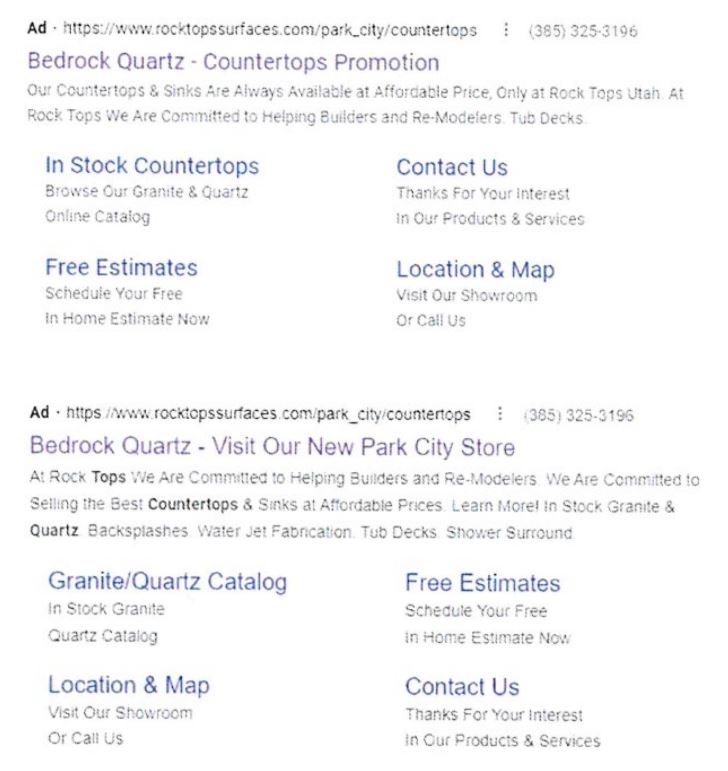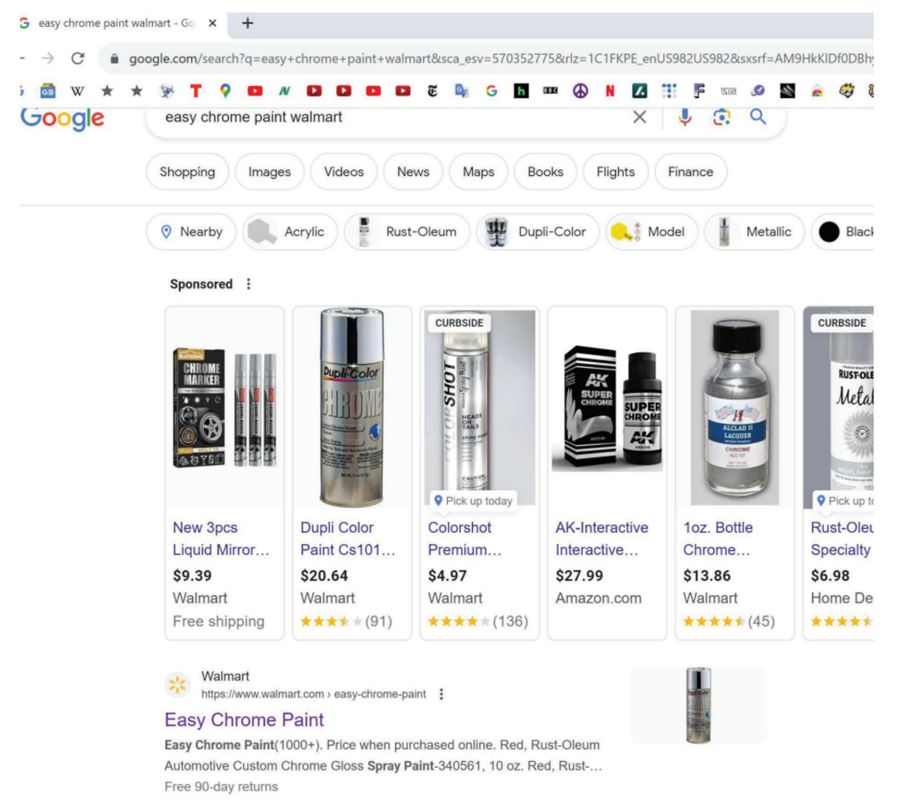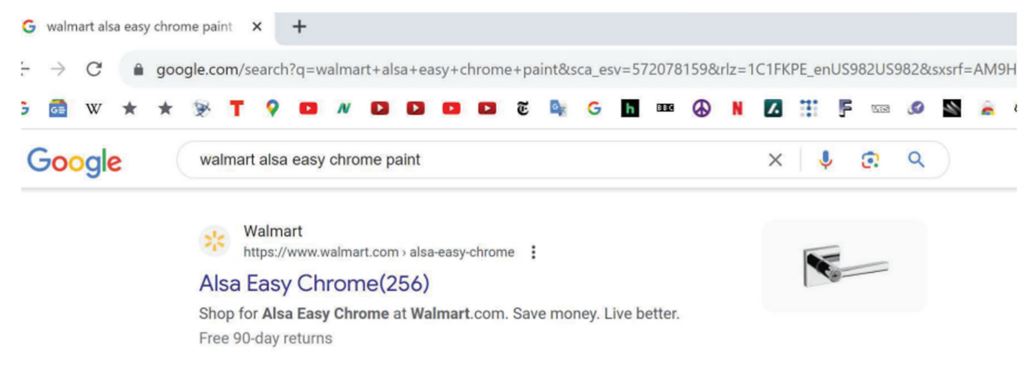Catching Up on Two Keyword Ad Cases
Technology & Marketing Law Blog 2024-10-06
A couple of keyword ad cases from a couple of months ago.
Alsa Refinish LLC v. Walmart Inc., 2024 WL 3914512 (C.D. Cal. July 31, 2024)
The trademark owner Alsa sells chrome paint. Walmart doesn’t carry the trademark owners’ items. In searches for the trademarks in Walmart’s internal search engine, Walmart only shows unrelated items–not items from the trademark owner or any competitors. Alsa complains about the following screenshots:
The second screenshot is an organic search result–a dead-end for the trademark owner. The court says “Because Walmart does not pay search engines to return organic search results or index webpages, it does not “use” the marks in connection with the sale or advertisement of goods.” The court adds:
The Google search results are simply Walmart webpages that contain search results themselves. Any user can produce this type of page by navigating to Walmart’s website and typing a search term into the search box (i.e., searching for “Alsa Easy Chrome” on Walmart.com to produce a webpage with the words “Alsa Easy Chrome” in the URL). It is hardly surprising that a Google search for “walmart alsa easy chrome paint” returns an indexed search results page on Walmart.com for “Alsa Easy Chrome.” Plaintiff does not show that the alleged Marks appear anywhere else on Walmart.com apart from where they are inputted as search terms. Walmart’s website does not label any of its products under the alleged Marks or contain any infringing products. Ultimately, Plaintiff has pointed out no evidence that Walmart did anything to appear on these unsponsored Google search results
The first screenshot shows some keyword ads from Walmart–but the search query doesn’t contain the trademark. Instead:
In a single instance, Walmart’s automated bidding system produced a “keyword” for the term “Alsa Chrome Paint.” However, there were no impressions or clicks against the term “Alsa Chrome Paint,” meaning that no one clicked on or even saw Walmart’s advertisement.
Seriously, dude? This is the tree that fell in the forest that no one was around to hear. Fire, ready, aim. WTF are we doing in federal court???
The court responds simply: “Walmart’s unseen use of this mark could not have caused any consumer confusion whatsoever, let alone a likely risk of confusion.”
Walmart ads showed up for the “easy chrome paint walmart” query because Walmart purchases “easy,” “chrome,” and “paint” as keywords. “Walmart contends that the purchase of these Google advertisements does not constitute a “use” of Plaintiff’s Marks. The Court agrees.”
The court explains:
source confusion does not exist because, as Plaintiff itself admits, Walmart does not sell any products that infringe on Plaintiff’s Marks—whether on its website or in stores. Therefore, no consumer purchasing a product from Walmart will incorrectly assume that the product is “associated with” Alsa Refinish.
The initial interest confusion doctrine doesn’t fare any better. The trademark owner sells expensive items, so purchasers will be careful. Google’s ad labeling also favors Walmart. Cites to Sen v. Amazon and Boost Beauty v. Woo Signatures. Thus, “it is highly unlikely that a prospective consumer looking for Plaintiff’s “easy chrome paint” would be confused by Walmart’s advertisements and unintentionally navigate to Walmart.com.”
Summary judgment to Walmart. This seems like a great case for the court to issue a fee shift to Walmart given the trademark owner’s absolute failure to show any harm.
Bedrock Quartz Surfaces LLC v. Rock Top Holdings, LLC, 2024 WL 3599064 (D. Utah July 31, 2024)
The parties compete to sell countertops. Rock Top bought some competitive keyword ads triggered by “bedrock quartz,” such as:
 When Bedrock Quartz complained, Rock Top’s team put the term on a negative keyword list. The court denies Rock Top’s motion for summary judgment.
When Bedrock Quartz complained, Rock Top’s team put the term on a negative keyword list. The court denies Rock Top’s motion for summary judgment.
Actual Confusion. “Rock Tops’ ads using the term “bedrock quartz” were seen by 2,518 people and 161 people clicked on the ads, for a click through rate of 6.4%.” 6.4% is a decent clickthrough rate, but per the Lens.com case, it’s well below the level of recognizable consumer confusion. The court acknowledges this in the footnotes, but still says this factor is neutral. Huh? It should be dispositive. Plus, FFS, we’re talking about a total of 161 clicks. Are the parties seriously going to litigate this to a trial? Remember: the only winnners of keyword ads lawsuits are the lawyers.
Mark Strength. The court says “Bedrock Quartz” is descriptive, and the plaintiff provided no evidence of consumer recognition, though it has spent $4M on marketing over the past 20 years. Good enough to make this factor weigh in favor of the plaintiff (huh?).
Consumer Care. The court says both parties only had lawyer arguments, not evidence, so this factor is neutral. Huh? Countertops are usually a multi-thousand dollar purchase, and they require significant consumer care to ensure the acquired countertops match their decor, have suffiicently durable surfaces, and fit the users’ space and size specifications exactly. How could this possibly be anything other than a situation where consumers are quite careful?
Defendant Intent. Apparently, selecting a rival’s trademark as a keyword is per se evidence of bad intent…even if it enhances competition and benefits consumers? Nice.
Product Similarity. The parties are direct competitors.
Mark Similarity. Citing Lens.com, the court says this factor is of minor relevance.
This is how the court decides to deny summary judgment on the likelihood of confusion. Wild.
Note that the plaintiff repeatedly invoked initial interest confusion, but the court essentially disregards those arguments.
More Posts About Keyword Advertising
* Competitor Isn’t Responsible for Google Knowledge Panel’s Contents–International Star Registry v. RGIFTS * TIL: “Texas Tamale” Is an Enforceable Trademark–Texas Tamale v. CPUSA2 * Internal Search Results Aren’t Trademark Infringing–PEM v. Peninsula * When Do Inbound Call Logs Show Consumer Confusion?–Adler v McNeil * Court Denies Injunction in Competitive Keyword Ad Lawsuit–Nursing CE Central v. Colibri * Competitive Keyword Ad Lawsuit Fails…Despite 236 Potentially Confused Customers–Lerner & Rowe v. Brown Engstrand * More on Law Firms and Competitive Keyword Ads–Nicolet Law v. Bye, Goff * Yet More Evidence That Keyword Advertising Lawsuits Are Stupid–Porta-Fab v. Allied Modular * Griper’s Keyword Ads May Constitute False Advertising (Huh?)–LoanStreet v. Troia * Trademark Owner Fucks Around With Keyword Ad Case & Finds Out–Las Vegas Skydiving v. Groupon * 1-800 Contacts Loses YET ANOTHER Trademark Lawsuit Over Competitive Keyword Ads–1-800 Contacts v. Warby Parker * Court Dismisses Trademark Claims Over Internal Search Results–Las Vegas Skydiving v. Groupon * Georgia Supreme Court Blesses Google’s Keyword Ad Sales–Edible IP v. Google * Competitive Keyword Advertising Claim Fails–Reflex Media v. Luxy * Think Keyword Metatags Are Dead? They Are (Except in Court)–Reflex v. Luxy * Fifth Circuit Says Keyword Ads Could Contribute to Initial Interest Confusion (UGH)–Adler v. McNeil * Google’s Search Disambiguation Doesn’t Create Initial Interest Confusion–Aliign v. lululemon * Ohio Bans Competitive Keyword Advertising by Lawyers * Want to Engage in Anti-Competitive Trademark Bullying? Second Circuit Says: Great, Have a Nice Day!–1-800 Contacts v. FTC * Selling Keyword Ads Isn’t Theft or Conversion–Edible IP v. Google * Competitive Keyword Advertising Still Isn’t Trademark Infringement, Unless…. –Adler v. Reyes & Adler v. McNeil * Three Keyword Advertising Decisions in a Week, and the Trademark Owners Lost Them All * Competitor Gets Pyrrhic Victory in False Advertising Suit Over Search Ads–Harbor Breeze v. Newport Fishing * IP/Internet/Antitrust Professor Amicus Brief in 1-800 Contacts v. FTC * New Jersey Attorney Ethics Opinion Blesses Competitive Keyword Advertising (…or Does It?) * Another Competitive Keyword Advertising Lawsuit Fails–Dr. Greenberg v. Perfect Body Image * The Florida Bar Regulates, But Doesn’t Ban, Competitive Keyword Ads * Rounding Up Three Recent Keyword Advertising Cases–Comphy v. Amazon & More * Do Adjacent Organic Search Results Constitute Trademark Infringement? Of Course Not…But…–America CAN! v. CDF * The Ongoing Saga of the Florida Bar’s Angst About Competitive Keyword Advertising * Your Periodic Reminder That Keyword Ad Lawsuits Are Stupid–Passport Health v. Avance * Restricting Competitive Keyword Ads Is Anti-Competitive–FTC v. 1-800 Contacts * Another Failed Trademark Suit Over Competitive Keyword Advertising–JIVE v. Wine Racks America * Negative Keywords Help Defeat Preliminary Injunction–DealDash v. ContextLogic * The Florida Bar and Competitive Keyword Advertising: A Tragicomedy (in 3 Parts) * Another Court Says Competitive Keyword Advertising Doesn’t Cause Confusion * Competitive Keyword Advertising Doesn’t Show Bad Intent–ONEpul v. BagSpot * Brief Roundup of Three Keyword Advertising Lawsuit Developments * Interesting Tidbits From FTC’s Antitrust Win Against 1-800 Contacts’ Keyword Ad Restrictions * 1-800 Contacts Charges Higher Prices Than Its Online Competitors, But They Are OK With That–FTC v. 1-800 Contacts * FTC Explains Why It Thinks 1-800 Contacts’ Keyword Ad Settlements Were Anti-Competitive–FTC v. 1-800 Contacts * Amazon Defeats Lawsuit Over Its Keyword Ad Purchases–Lasoff v. Amazon * More Evidence Why Keyword Advertising Litigation Is Waning * Court Dumps Crappy Trademark & Keyword Ad Case–ONEPul v. BagSpot * AdWords Buys Using Geographic Terms Support Personal Jurisdiction–Rilley v. MoneyMutual * FTC Sues 1-800 Contacts For Restricting Competitive Keyword Advertising * Competitive Keyword Advertising Lawsuit Will Go To A Jury–Edible Arrangements v. Provide Commerce * Texas Ethics Opinion Approves Competitive Keyword Ads By Lawyers * Court Beats Down Another Competitive Keyword Advertising Lawsuit–Beast Sports v. BPI * Another Murky Opinion on Lawyers Buying Keyword Ads on Other Lawyers’ Names–In re Naert * Keyword Ad Lawsuit Isn’t Covered By California’s Anti-SLAPP Law * Confusion From Competitive Keyword Advertising? Fuhgeddaboudit * Competitive Keyword Advertising Permitted As Nominative Use–ElitePay Global v. CardPaymentOptions * Google And Yahoo Defeat Last Remaining Lawsuit Over Competitive Keyword Advertising * Mixed Ruling in Competitive Keyword Advertising Case–Goldline v. Regal * Another Competitive Keyword Advertising Lawsuit Fails–Infogroup v. DatabaseLLC * Damages from Competitive Keyword Advertising Are “Vanishingly Small” * More Defendants Win Keyword Advertising Lawsuits * Another Keyword Advertising Lawsuit Fails Badly * Duplicitous Competitive Keyword Advertising Lawsuits–Fareportal v. LBF (& Vice-Versa) * Trademark Owners Just Can’t Win Keyword Advertising Cases–EarthCam v. OxBlue * Want To Know Amazon’s Confidential Settlement Terms For A Keyword Advertising Lawsuit? Merry Christmas! * Florida Allows Competitive Keyword Advertising By Lawyers * Another Keyword Advertising Lawsuit Unceremoniously Dismissed–Infostream v. Avid * Another Keyword Advertising Lawsuit Fails–Allied Interstate v. Kimmel & Silverman * More Evidence That Competitive Keyword Advertising Benefits Trademark Owners * Suing Over Keyword Advertising Is A Bad Business Decision For Trademark Owners * Florida Proposes to Ban Competitive Keyword Advertising by Lawyers * More Confirmation That Google Has Won the AdWords Trademark Battles Worldwide * Google’s Search Suggestions Don’t Violate Wisconsin Publicity Rights Law * Amazon’s Merchandising of Its Search Results Doesn’t Violate Trademark Law * Buying Keyword Ads on People’s Names Doesn’t Violate Their Publicity Rights * With Its Australian Court Victory, Google Moves Closer to Legitimizing Keyword Advertising Globally * Yet Another Ruling That Competitive Keyword Ad Lawsuits Are Stupid–Louisiana Pacific v. James Hardie * Another Google AdWords Advertiser Defeats Trademark Infringement Lawsuit * With Rosetta Stone Settlement, Google Gets Closer to Legitimizing Billions of AdWords Revenue * Google Defeats Trademark Challenge to Its AdWords Service * Newly Released Consumer Survey Indicates that Legal Concerns About Competitive Keyword Advertising Are Overblown
The post Catching Up on Two Keyword Ad Cases appeared first on Technology & Marketing Law Blog.

